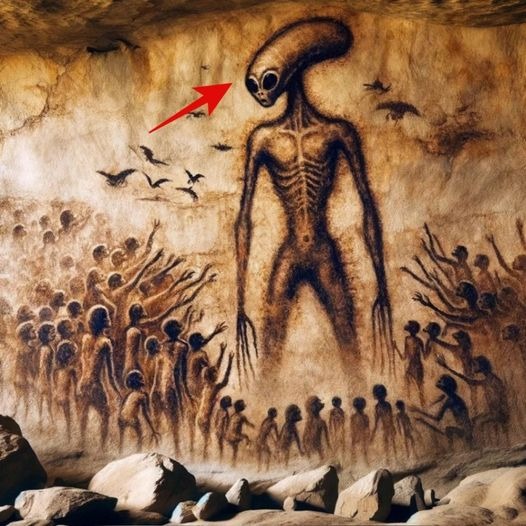Nestled within the vast expanse of the Sahara Desert lies Tassili n’Ajjer, a UNESCO World Heritage Site renowned for its breathtaking landscapes and remarkable prehistoric rock art. Among the myriad of ancient cave paintings adorning the sandstone cliffs of this remote region are depictions that have intrigued researchers and enthusiasts for decades—mysterious figures bearing striking resemblance to extraterrestrial beings. These enigmatic images offer a glimpse into the beliefs, imagination, and possibly encounters of ancient civilizations, sparking curiosity and speculation about the existence of ancient alien visitations.

The Enigmatic Cave Paintings: Dating back thousands of years, the cave paintings of Tassili n’Ajjer provide a window into the lives and beliefs of ancient peoples who once inhabited the region. Among the myriad of motifs and scenes depicted on the cave walls are images that stand out for their otherworldly characteristics—strange humanoid figures with elongated heads, large eyes, and peculiar features reminiscent of modern-day depictions of aliens. These mysterious beings are often portrayed alongside more familiar scenes of daily life, hunting, and ritualistic activities, adding to the intrigue surrounding their significance.
Interpretations and Speculations: The interpretation of the alien-like figures depicted in the cave paintings of Tassili n’Ajjer has sparked a wide range of speculations and theories among researchers and enthusiasts. Some believe that these images are symbolic representations of spiritual beings, deities, or supernatural entities worshipped by ancient civilizations. Others posit that they may be artistic expressions of dreams, visions, or hallucinations experienced by the artists. However, a compelling theory gaining traction is that these figures could be evidence of ancient encounters with extraterrestrial beings, suggesting the possibility of ancient alien visitations to Earth.
Ancient Astronaut Hypothesis: The concept of ancient alien visitations, popularized by Swiss author Erich von Däniken in his groundbreaking book “Chariots of the Gods?” has led to the development of the ancient astronaut hypothesis—a theory that suggests that advanced extraterrestrial beings visited Earth in ancient times and played a role in shaping human civilization. Proponents of this theory point to ancient artifacts, texts, and archaeological anomalies as evidence of such encounters, with the cave paintings of Tassili n’Ajjer cited as compelling examples of possible extraterrestrial influences on ancient cultures.
Scientific Inquiry and Exploration: While the notion of ancient alien visitations remains controversial within the scientific community, the cave paintings of Tassili n’Ajjer continue to be a subject of fascination and study for researchers and enthusiasts alike. Advanced imaging techniques, such as photogrammetry and digital analysis, are being employed to study the cave paintings in greater detail, shedding light on their origins, symbolism, and possible interpretations. Interdisciplinary collaboration between archaeologists, anthropologists, and ufologists is essential to approach the study of these enigmatic images with scientific rigor and objectivity.
The ancient cave paintings of Tassili n’Ajjer stand as silent witnesses to the mysteries of the past, offering tantalizing glimpses into the beliefs, experiences, and possibly encounters of ancient civilizations. While the interpretation of these enigmatic images remains subject to debate and speculation, they serve as a reminder of the boundless curiosity and imagination of humanity throughout the ages. Whether symbolic representations of spiritual beings, artistic expressions of dreams, or evidence of ancient alien visitations, the cave paintings of Tassili n’Ajjer continue to captivate the imagination and inspire wonder about the mysteries of the cosmos and our place within it
